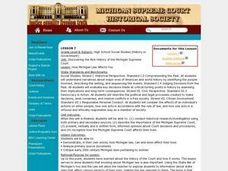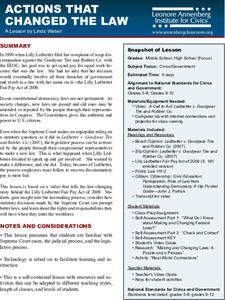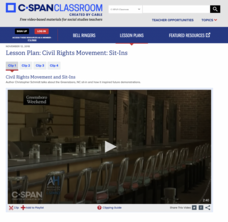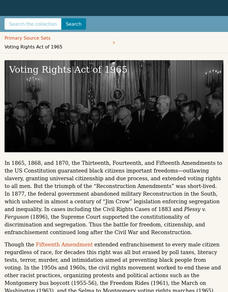Curated OER
Judicial Review
Students are introduced to the concept of judicial review. They read an article about this topic and the Bill of Rights. They answer discussion questions and review as a class.
Curated OER
social Studies: First Amendment Role-Play
Students evaluate First Amendment case decisions by the Supreme Court. they divide into three groups - Supreme Court justices, prosecution attorneys, and defense lawyers. Both sides present their arguments and the justices deliver...
Curated OER
How Michigan Law Affects You
Students examine how the laws in Michigan affect their lives. They use primary source documents to analyze the state's history. They discuss laws pertaining to women as well.
Curated OER
Brown v. Board of Education of Topeka
Twelfth graders explore desegregation as it occurred at various stages in United States history. They specifically chronicle the role of South Carolina in the desegregation case of Brown v. Board of Education.
K20 LEARN
Oklahoma and Segregation
It was not just the states of the Deep South that practiced segregation. Young historians investigate the history of segregation and desegregation in Oklahoma. They begin by reading, annotating, and analyzing an article about the impacts...
Annenberg Foundation
Actions that Changed the Law
The Fair Play Act of 2009 came about due to the actions of one woman. Young historians research Lilly Ledbetter and what she went through to get pay equal to that paid to men for the same work at Goodyear Tire and Rubber Company. The...
Alabama Department of Archives and History
Montgomery Bus Boycott: We Would Rather Walk!
Have historians use primary sources to learn about the circumstances and implementation of the Montgomery Bus Boycott, and think about the issue of boycotts as a means of effecting social change. Wrap it up with a letter to the editor...
Constitutional Rights Foundation
The Census in US History
The census has been a part of the American landscape since the Constitution was written; however, it does have a history of controversy. Class members use a guided reading and simulation activity on developing census questions to...
National Endowment for the Humanities
A Day for the Constitution
The "Constitution Day and Citizenship Day" law requires schools receiving any federal funding to provide educational programming on the history of the American Constitution. The lesson plans, materials, videos, questions, and activities...
C-SPAN
Civil Rights Movement: Sit-Ins
Part of the protests of the Civil Rights Movement were small scale sit-ins at lunch counters. This form of on-the-ground activism is the focus of a C-SPAN resource that includes four video-clips about the sit-ins by pupils at a lunch...
Center for History Education
Brown v. the Board of Education: Success or Failure?
Desegregation does not mean equality. An eye-opening activity focuses on the impact of the Brown v. Board of Education decision to end school segregation. Scholars review a series of political cartoons to understand how the public viewed...
Carolina K-12
Citizens United v. Federal Election Commission & the First Amendment
Should Congress limit how much a corporation spends to support a political candidate? Here is a fantastic lesson plan and activities to help young citizens approach this question.
Constitutional Rights Foundation
Why We Have Freedom of the Press
A newspaper receives documents that reveal not only a devastating secret the public needs to know, but also troop movements that could put American lives at risk: to publish or not to publish? Using background readings, discussion...
Digital Public Library of America
Voting Rights Act of 1965
Despite the passing of the Thirteenth, Fourteenth, and Fifteenth Amendments, as well as the passing of the Voting Rights Act of 1965, the struggle to ensure fair voter registration and election procedures continues. Young historians...
Smithsonian Institution
Re-Segregation of American Schools: Re-Segregation
Examine the re-segregation of public schools in a thought-provoking resource. Young scholars read articles and primary sources, complete worksheets, and watch a video to explore the idea that desegregation made schools more segregated....
Curated OER
Racism, Discrimination, and the Law
Seventh graders examine the various racism and discrimination faced by various ethnic groups in the United States. In groups, they research the legal system and describe the purpose of the United States Constitution. They review cases...
Curated OER
Fruit or Vegetable?
Watermelon is a vegetable? A tomato is a fruit? Believe it or not, this debate is decades old. Groups examine rulings by the US Supreme Court, the USDA, and state statutes before developing their own criteria to use when labeling the...
Curated OER
Does Free Speech Exist in School?
Students examine their own First Amendment rights as students. They read and discuss a news article, discuss the Supreme Court case Frederick v. Morse, take an online quiz and conduct Internet research, and create a brochure outlining...
Curated OER
Social Studies: Vocabulary
Build vocabulary and have a class discussion. Use this PowerPoint to illustrate concepts of Early American History, including, Bill of Rights, Supreme Court, elections, and the Constitution. Note: Each slide has only a single vocabulary...
Curated OER
Rights in Conflict
Learners study situations where rights are in conflict. In this conflict in rights lesson, students review a conflict situation and the Supreme Court ruling for the issue. Learners review the Bill of Rights and then receive their own...
Curated OER
How was the Constitution Used to Organize the New Government?
How did the United States Congress determine how the new president and vice president would be named when the nation was first established? Who would provide money for the government, and how would the executive branch be organized?
Curated OER
Judicial Review
High schoolers review the concepts they were introduced to in a telecast on judicial review. After reading an article, they answer discussion questions and repeat the same procedure for another article. They participate in a debriefing...
Curated OER
the Impact of the U.s. Supreme Court on High School Journalism.
Young scholars study of the First Amendment, Tinker, Hazelwood and the Colorado Student Free Expression Law. They discuss the ramifications on the student press and recite their memorized First Amendment rights. They discover what...
Curated OER
Michigan Supreme Court
Learners read articles on a hot topic (controverial topic) and prepare for a discussion on the article. They engage in forming an opinion on an important public concern and defending their opinion/position with supporting data. They...
Other popular searches
- Supreme Court Cases
- Supreme Court Case Studies
- Supreme Court Justices
- The Supreme Court
- Landmark Supreme Court Cases
- Supreme Court Decisions
- Supreme Court Rulings
- Corporations Supreme Court
- Writing Lesson Supreme Court
- Michigan Supreme Court
- Supreme Court Nominations
- Famous Supreme Court Cases

























